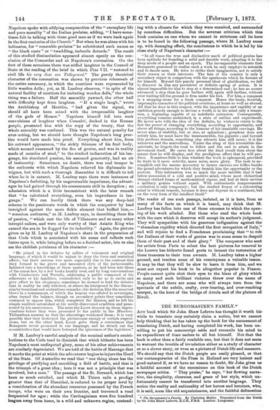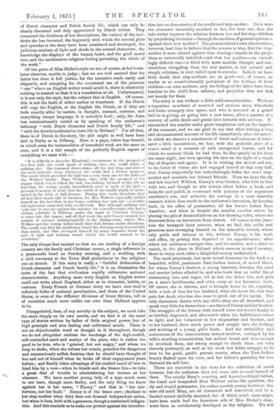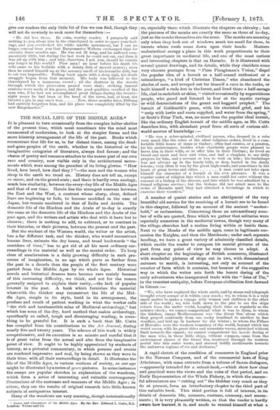THE BURGOMASTER'S FAMILY.*•
ANY book which Sir John Shaw Lefevre has thought it worth his while to translate may certainly claim a notice, but we cannot help thinking that he has taken up the book for the amusement of translating Dutch, and having completed his work, has been un- willing to put his manuscript aside and reconcile his mind to an expenditure of time useless to all but himself. Not that the book is other than a fairly readable one, but that it does not seem to warrant the trouble of trstaslation either as a study of character or as a clever story, or even as a picture of Dutch life and manners. We should say that the Dutch people are easily pleased, or that our contemporaries of the Press in Holland are very lenient and' good-natured if, as we-have no reason to doubt, Sir John gives us a faithful account of the encomiums on this book of the Dutch newspaper critics. "They praise," he says, "her flowing narra- tive, the simplicity, clearness, and grace of her style, which un- fortunately cannot be transferred into another language. They notice the reality and nationality of her heroes and heroines, who,. it is said, seem like old acquaintances, and the faithful delineation', * The Burgomaster's Family. By Christine Muller. Translated from the Dutch: by Sir John Shaw Lefevre, B.C.B., F.R.S. London: Longtoans.
of Dutch character and Dutch family life, which can only be clearly discerned and duly appreciated by Dutch critics. They commend the liveliness of her descriptions, the variety of the inci- dents she has invented, the ingenuity with which the several plots and episodes in the story have been combined and developed, the judicious mixture of light and shade in the several characters, the knowledge she displays of the human heart, and the good moral tone and the unobtrusive religious feeling pervading the whole of the work."
Of the grace of Miss Muller's style we are, of course, as her trans- lator observes, unable to judge ; but we are well assured that the latter has done it full justice, for the narrative reads easily and elegantly, and excepting for the occasional use of the pronoun "one" where an English writer would avoid it, there is absolutely nothing to remind us that it is a translation at all. Unfortunately it is not only the style, but the subject that is English. Of course, this is not the fault of either author or translator. If the Dutch will copy the English, or the English the Dutch, or if they are both exactly alike by nature, in thought, manner, customs, and everything except language, it is nobody's fault ; only, Sir John has unintentionally misled us by speaking of the authoress's intimacy " with Dutch character and Dutch family life," and "with the details incidental to town life in Holland." For all that, there is of Dutch in the story, the plot might as well have been laid in Derby as in Dilburg. Here is a page, taken hap-hazard, in which even the technicalities of household work are the same as ours, and it is a fair sample of the perfectly English aspect of everything we meet with :—
"It is difficult to describe Elizabeth's excitement at the prospect of her first ball ; she could speak of nothing else ; she could think of nothing else. She hummed dance-tunes all the day long, and danced the most fantastic steps whenever she could find a leisure moment. The week which preceded the ball was a very busy one for the ladies of the Welters' family. Papa Welters, who, with the prospect of the supper which was to follow the ball, was looking forward to the fete no less than the young people. immediately gave to each of his girls a present of money, in order that the credit of the family might be main- tained in the form of ball-dresses. During this week, therefore, they all had their hands full of business, for Mrs. Welters especially prided herself on the fact that, in her house, nothing was put out '—a techni- cal expression connected with needlework. But although nothing was put out.' it was not against the statutes for a needlewoman who had a certain celebrity in Dilburg, under the name of 'Crooked Coozey,' to come into the house; and all that week the said Coozey swayed her sceptre of scissors uninterruptedly in the dining-room, where Mrs. Welters and the young ladies made their ball-dresses under directions. The result was that the gentlemen found the drawing-room less sociable than usual. and Otto revenged himself by saucy remarks about the axis of tube and tarlatan round which the world seemed to be revolving."
The only things that remind us that we are reading of a foreign country are the family and Christian names, a single reference to a promenade band on Sunday evening, and a wedding with a civil ceremony at the Town Hall preliminary to the religious one at church. If this story is really a "faithful delineation of Dutch character and Dutch family life," it is an illustration the more of the fact that civilization rapidly obliterates national characteristics. Anything more truly English an English writer could not write about England, either as to character, habits, or customs. Every French or German story we have ever read is infinitely fuller of national peculiarities, and those of the United States, or even of the different divisions of Great Britain, tell us of countries much more unlike our own than Holland appears to be.
Disappointed, then, of any novelty in the subject, we must take the story simply on its own merits, and we find it of the usual type of stories written by ladies of little original power, but of high principle and nice feeling and cultivated minds. There is not an objectionable word or thought in it throughout, though we do not altogether endorse the teachings of the high-souled, self-controlled saint and martyr of the piece, who is rather too good to be true, who is "grieved, but not angry," and whom we
long to shake, when she refuses her cousin;-preaches the dangerous and unconsciously selfish doctrine that he should have thought of her and not of himself when he broke off their engagement years before ; and finally takes advantage of his exalted mood of love to
bind him by a vow—when he kneels and she blesses him—to take a great deal of trouble in administering her income as her almoner. We have another young lady of a type much more to our taste, though more faulty, and the only thing we know against her is her name, " Emmy," and that is "her mis- fortune,,not her fault." Emmy is of the brave sort; obedient to her step-mother when duty does not demand independent action, but when it does, bold with a generous, though a restrained indigna- tion. And this reminds us to make our protest against the introduc- tion into modern stories of the traditional step-mother. Even were the character invariably ascribed to her, her true one, does the tale-writer improve the relation between her and her step-children by prejudicing the latter—through the medium of generalopiniou- against their new mother ? The present writer's own observations, however, lead him to believe that the reverse is true, that the step- mother is more sinned against than sinning—thanks to the preju- dices so universally instilled—and that her position—an exceed- ingly difficult one—is filled with more anxious thought and con- scientious struggling than the real mother, in her natural and simple relations, is ever called upon to exercise. Indeed, we have little doubt that step-mothers are as good—not, of course, as tender or as constitutionally percipient of the feelings of their children—as own mothers, only the failings of the latter have been familiar to the child from infancy, and prejudice does not look out keenly for them.
The story is not without a little mild sensationalism. We have a repentant murderer of reserved and anxious mien, who starts and looks strangely into space, and who is arrested at a grand ball he is giving, on going into a new house, after a quarter of a century of noble deeds and gentle love towards wife and son. II committed the murder under great temptation and on the impulse of the moment, and we are glad to say that after writing a long and circumstantial account of his life immediately after his arrest, in which we observe a minuteness of detail and calmness of retro- spect a little inconsistent, we fear, with the probable state of a reau's mind at a moment of such unexpected horror, and for which we scarcely think he had time, he dies quietly in his sleep the same night, not even opening his eyes on the light of a single day of disgrace and agony. It is in visiting the widow and son, to the latter of whom she had engaged herself at that very ball, that Emmy respectfully but unhesitatingly defies her cruel step- mother and comforts her beloved friends. Then we have the sly and low-minded William, Ernmy's step-brother, who falls in love with her, and though he sits always silent before a book, and looks fat and pallid, is consumed with jealousy of the repentant murderer's sou, and achieves his revenge in a most masterly manner, which does credit to the authoress's invention, by keeping back, in his office of postmaster, all her lover's letters from America ; and when in despair she marries another suitor, by placing the pile of detained letters on her dressing-table, where she discovers them on her return from church. Of course at this junc- ture the betrayed lover returns, when we find this noble and generous man revenging himself on the miserable wretch, whose only pride and interest in life, without Emmy, is his work and office, by getting him deprived of his appointment ; after which our authoress consigns him, and his mother, and a sister to match, to the place in Holland which answers to our Coventry, there to enjoy each other's delightful society undisturbed.
The most prominent, but most unreal character in the book is a beautiful, wilful, passionate East-Indian heiress, of mixed blood, for whom Emu's brother, a young barrister, forsakes the saint and martyr before alluded to, and who leads him an awful life of alternating love and anger, till at last she defies him, and puts on a man's habiliments, and rides away on her favourite Arab. Of course she is thrown, and is brought home to die, expiring, with a look of love for her husband, when she hears the shot that puts her Arab, who has also come to grief, out of his agony. The only characters drawn with any skill—they are all described, and speak very little for themselves—are those of Emmy and her brother. The struggles of the former with herself when her lover's family is so terribly disgraced, and afterwards when his faithfulness comes to light, and her behaviour to her stepmother and brother, and to her husband, show much power and insight into the feelings and working of a young girl's heart. And the irritability and narrowness of the conscientious lawyer-brother, outraged by his wife's startling eccentricities, but neither broad and wise enough to overlook them, nor strong enough to check them, are very cleverly portrayed, as well as his weak but bitter struggle to be true to his good, gentle, prosaic cousin, when the East-Indian beauty flashed upon his view, and her father's partiality for him flattered his self-love.
There are materials in the story for the exhibition of much humour, but the authoress does not seem able to avail herself of them. The saintly Mary's exacting and hypochondriacal father, the timid and henpecked Herr Welters' swine-like qualities, the sly and stupid postmaster, the rather peevish young barrister, the sour old maid Mina, are all characters well conceived, and to a limited extent skilfully sketched, but of which much more might
have been made had the humorous aide of Miss Muller's char- acter been as satisfactorily developed as the religious. ‘Ve will
give our readers the only little bit of fun we can find, though they will not do unwisely to seek more for themselves
did live there. Be calm, worthy reader. I purposely said nothing to you about him in the churchyard in order to spare your feel- ings, and you overlooked his white marble monument, but I can no longer conceal from you that Burgomaster Wolters exchanged time for eternity three months ago. He was not ill long, and he suffered com- paratively little, but during the last week he could not eat, and then it was all up with him ; and why, therefore, I ask you, should he remain any longer in this world ? Poor man! an hour before his death his wife came to his bedside with a dainty dish of stewed oysters ; even then he raised himself up at the savoury smell of his favourite dish, but to eat was impossible. Falling back again with a deep sigh, his death struggle began from that moment. His body was followed to the churchyard by a numerous crowd ; all the shutters in the streets through which the procession passed were shut; striking funeral orations were made at his grave, and the good qualities recalled of the man who, if he had not accomplished great things during the twenty- eight years he had been at the head of the town, had, at least, not
thrown a pin in any one's way Now, three months later, Dilburg had entirely forgotten him, and his place was completely filled by the new Burgomaster."








































 Previous page
Previous page